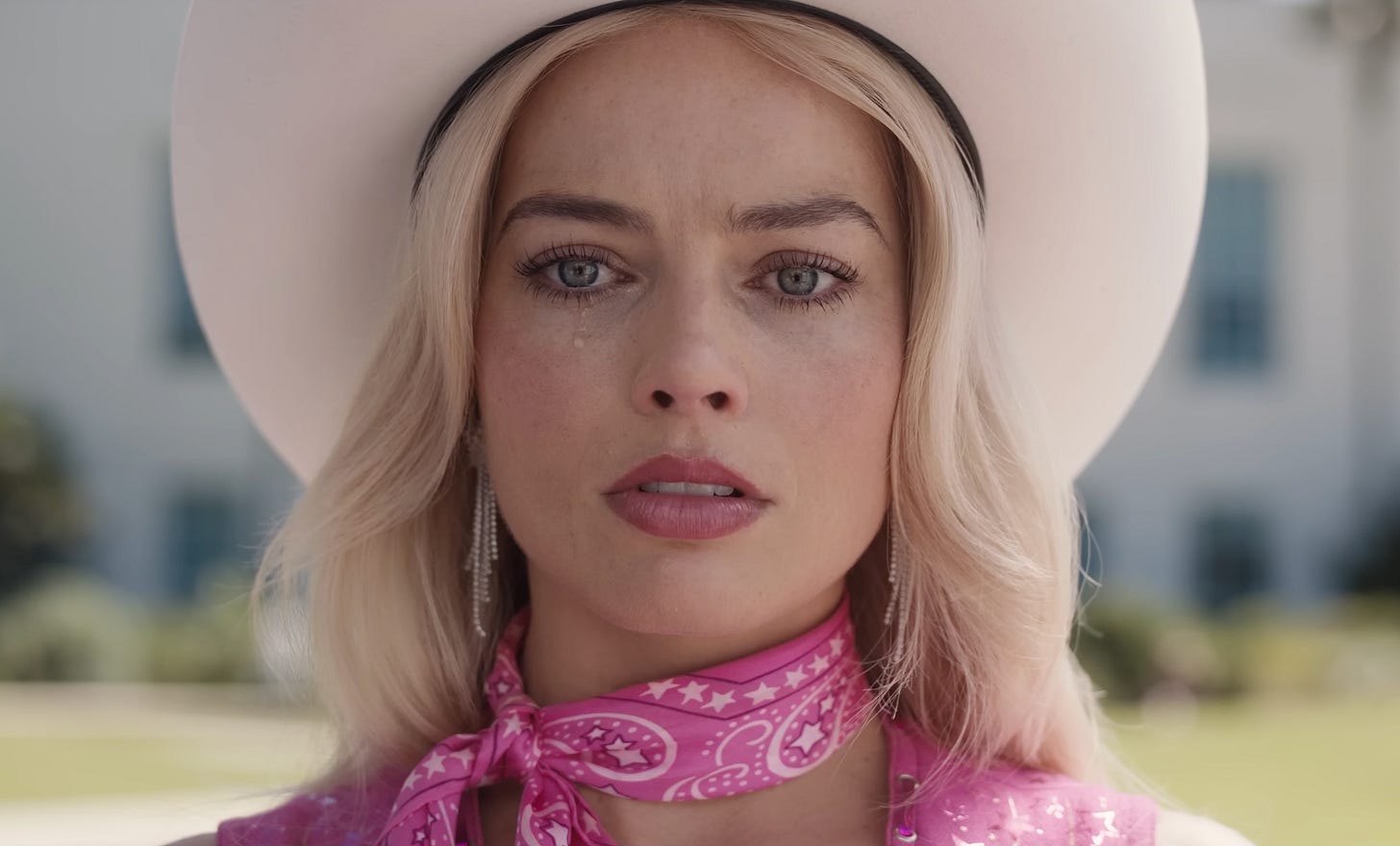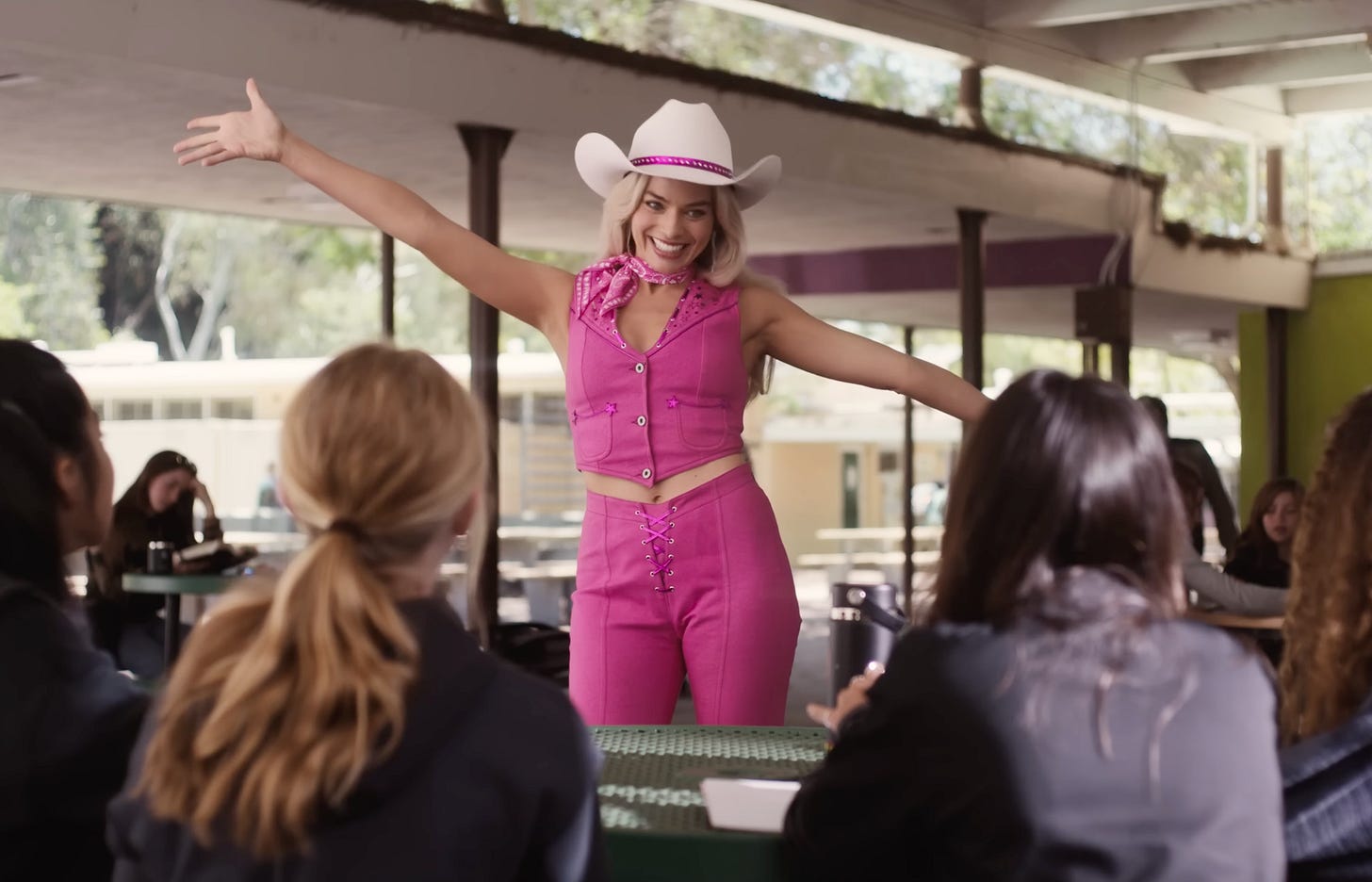What Was I Made For?
On the biggest movie of the summer and whether Greta Gerwig’s take on a capitalist icon is as subversive as it claims to be.
This is PR Machine, a newsletter about consciousness and culture and the sprawling treacherous jungle that lies between them. Subscribe to watch a humble twentysomething navigate this wilderness in real time. Much magic to come.
It’s a summer afternoon in 2005 and the sunlight that streams through my bedroom window has an elemental brightness to it. The room is scattered with bright-colored fabrics: little dresses, sequined skirts, slip-on mermaid tails. I’m pacing the carpet on bug-bite ridden legs; in my hand, Barbie flies.
It’s a relatively mundane image. I spent countless afternoons in a similar position. But lately it’s felt weightier. Perhaps that’s a product of the fuchsia monolith looming over the culture, the inescapable marketing for this summer’s tentpole blockbuster. That’s the nexus of the intellectual property market, isn’t it? Detect a pre-existing attachment between consumer and product, emphasize and/or exaggerate it, capitalize, repeat. It’s why we have all the comic book films, the live-action Disney remakes. It’s why your favorite (and not-favorite) ‘90s sitcoms are being cast into the uncanny valley in the form of streaming-original reboots. Nostalgia is the sacred cash cow of the entertainment industry: similar to escapism, but with a sense of connection to the past — both personal and collective — that adds an ostensible layer of depth.
But maybe that’s not all it is. Just because something’s profitable doesn’t mean it’s void of emotional truth. That’s what happens when brands and products become a part of our daily lives from childhood; we’re forced to enter the sticky world of Roland Barthes, of intent versus impact, signifiers and signifieds. Barbie is a corporate asset, certainly, yet she’s a figure that holds meaning for many, an emblem of younger years and the inevitable accompanying baggage. Barthes would call this association a “myth,” but we are humans before theorists, helpless in the face of our emotions. Barbie certainly meant something to me, an early indication of my leanings toward the feminine; I look back at it now with deep affection but my infatuation with her was one riddled with dissonance and identity-based anxiety. I was lucky enough to be supported by my family and many of the adults in my life, but outwardly she was my first version of the closet, a deep point of shame. I’m certainly not alone in this. On a systemic level, she was a perpetuator of the binary, a girl’s toy; I was pointedly marked as “other” by not fitting into her target demographic. But on the personal, I explored so much of myself through her.
It’s this type of contradiction that’s baked into Barbie’s very essence. She is many things to many people, and I don’t just mean that in terms of the number of occupations she’s taken on in her lifetime. She’s a semiotics goldmine: an icon of 20th-century American capitalism, a skewed notion of the ideal woman, commodified girl power made manifest. The plastic face of a thousand paradoxes. She came to be in 1959, in the midst of the post-war industrial boom, when mass culture was exploding and the American dream morphed from bootstrap rags-to-riches optimism to manicured lawns and picket-fence materialism. She’s come to represent a number of societal evils: rampant capitalism, Eurocentric beauty ideals, impossible body proportions. Yet there was a whisper of feminism in her creation: before her, the only widely-available dolls were baby dolls, a way for girls to practice motherhood (you might call this “grooming”). Ruth Handler created Barbie to provide her daughter, and other young girls, with a different image of adult life. So goes the lore, at least. She was meant to embody the modern woman. But to be “modern,” first and foremost, was to consume. It also apparently meant having blonde hair, blue eyes, pointy breasts and an insect’s waist.
Is Barbie a capitalist behemoth with heart? That’s certainly the tightrope Mattel seeks to walk with Barbie. The film is a clear extension of Barbie-as-corporate-asset, the first fruit of the company’s move away from manufacturing and towards the world of IP and franchising — there is already much buzz about the wholly unnecessary “Mattel Cinematic Universe,” with upwards of twenty new projects in line for production (including a gritty “A24-type” Barney movie about “millennial angst”…). But this Barbie is directed by Greta Gerwig, a filmmaker whose idiosyncratic voice is known for outlining and celebrating poignant truths of the female experience. Her filmography reads as a love letter to the transitional period between girlhood and womanhood, with all of its baggage and growing pains. She’s a filmmaker who’s not only feminist but deeply humanist, with wells of empathy for even her smallest characters (remember the drama teacher in Lady Bird? I can’t forget him).
And so it felt like a match made in heaven, to have one of the most prominent female (and feminist) directors in the industry take on one of culture’s most controversial symbols of the feminine. And if Barbie’s greatest emotional pull is her connection to our collective childhood, Gerwig’s experience with the coming-of-age narrative made her the perfect candidate for the job. She breathes a great deal of humanity into Barbie’s world. There is a palpable amount of love and care put into the film, from the production design (all of those sets were fully constructed, even the painted skies) to the influences (a wide array, though particularly many technicolor musicals of the ‘50s and ‘60s, like the immaculate Umbrellas of Cherbourg). Gerwig has stated that “authentic artifice” was the buzzword she used over and over during production, and that ethos rings clear in many respects.
The most exciting selling point leading up to the film, though, was the story. Barbie was to be confronted with thoughts of mortality, to experience both a feminist awakening and an existential crisis — all wrapped up in a technicolor summer romp. The press rollout has been long and relentless, and throughout it, both Gerwig and star/producer Margot Robbie have repeatedly described the film as “feminist” and “surprisingly profound,” recounting how hard they had to fight to keep Mattel from sterilizing the story.
But is this a subversive film? It doesn’t quite feel like one. It starts off strong, but each time I expected it to go there, it fell short. There is very little capitalist critique here, save for a choice moment where a real-life teen calls Barbie a “fascist” (later, weeping to herself, Barbie laments: “I don’t control the railways, or the flow of commerce!” Even when skirting past themes, this film is funny). But Barbie never feels any conflict about being a product, that her very existence is commodified. The Mattel send-up is essentially toothless. The more emotional and existential moments, too, feel clipped, eventually falling somewhat to the wayside in favor of a pop feminist critique on the rift between the girl power of Barbie Land and the patriarchy of the real world. These are notable themes, and they’re explored deftly, with large amounts of comedy (especially if you’ve ever had a man play the guitar at you or heard him wax about The Godfather). But if you look at Barbie’s larger sociological footprint, it feels like an easy out.
Perhaps that’s just what happens when a film bites off more than it can chew. There’s a potent (if not quite razor-sharp) monologue in which America Ferrera’s character explains the conundrum of being a woman, the contradictions and impossible standards that women are expected to embody, all at once. It seems this catch-22 is being posited as a dilemma the film itself faces. It does beg the question: Is Barbie being held to a different standard from all the other IP fare? This is a film directed and produced by two women. Yet this evaluation stems from the film’s attempt to do more than sell toys, to contain depth and social critique — the film shouldn’t be punished for that intent, but when that becomes both a goal and a marketing tool, its success is bound to be measured. Barbie the film can’t be everything. I only wish it honed its perspective more.
But this is not an art film. It’s a massive summer tentpole, a major corporate gamble, a for-the-masses blockbuster. In the end I have to commend Gerwig and Robbie’s tussling with Mattel, their efforts to inject critique and integrity into what easily could have been a brainless two-hour advertisement. It also isn’t a movie for me; we all experience patriarchy, but as a man it makes sense why some of the themes didn’t strike a nerve — an obvious statement but one that’s important to point out. And the film is striking for many, if my For-You Page is any indication; the Barthes-ian “myth” of Barbie, our collective linking her to childhood — to girlhood — is clearly causing some catharsis. And if we’re talking about subversive potential, we should also be looking at reach. I, a queer, 24-year-old liberal arts graduate living in Brooklyn, was probably never going to find this film revolutionary. But Barbie has already made half a billion dollars around the globe. It didn’t have to have a single thought in its head, but it does. Barbie has always been critiqued for influencing the minds of the young; at least now, alongside the tie-in marketing, there’s a real treatise on womanhood, patriarchy, and the importance of being human.
I saw this film on a Monday afternoon, sitting next to a young girl and her mother. At one point, comforting an upset Ken, Barbie says, “I just learned how to cry, it’s actually amazing.” The little girl — probably six or seven years old — turned to her mother and said, “Crying is amazing!” That got to me more than anything in the movie. And if that’s the kind of effect it’s having, I really can’t be mad about its existence.



